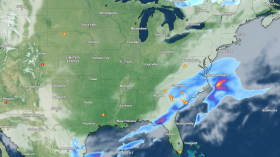Even as the world's temperature increases due to climate change, there will not be fewer cold-weather-related deaths during the coldest times, a new study reports.
The research, published in the journal Nature Climate Change, runs counter to the belief that excess wintertime deaths would be reduced because of global warming, at least in the United Kingdom, where the research took place.
Researchers at the University of Exeter and University College London analyzed 60 years of data regarding the UK's winter death rate and what factors influenced it over time.
In the past, cold weather was linked to excess wintertime deaths, particularly from 1951-1971. But from 1971-1991 excess wintertime deaths were attributed to both cold days and the flu, the researchers report. That changed from 1991-2011, when flu activity alone was the main cause in year to year variation in winter mortality.
"We've shown that the number of cold days in a winter no longer explains its number of excess deaths. Instead, the main cause of year to year variation in winter mortality in recent decades has been flu," said lead researcher Philip Staddon of the University of Exeter.
Staddon and his team suggests that improvements in housing, health care, income and greater awareness of the health risks cold weather can pose have led to the shift in causes of wintertime mortality.
As years go by, the UK is likely to undergo periods of extreme and unpredictable weather. Despite a generally warmer winter as a result of global warming, the researchers contend that a more volatile climate could actually lead to more wintertime deaths associated with climate change, rather than fewer.
"Climate change appears unlikely to lower winter death rates. Indeed, it may substantially increase them by driving extreme weather events and greater variation in winter temperatures. Action must be taken to prevent this happening," said study co-author Hugh Montgomery of University College London.
"Both policy makers and health professionals have, for some time, assumed that a potential benefit from climate change will be a reduction in deaths seen over winter," Staddon said. "We've shown that this is unlikely to be the case. Efforts to combat winter mortality due to cold spells should not be lessened, and those against flu and flu-like illnesses should also be maintained."
© 2024 NatureWorldNews.com All rights reserved. Do not reproduce without permission.

![Origin of Life: Discovery of Lava Being a Building Block of Life Hints 'Humans Have Volcanic Origins' [Study]](https://1471793142.rsc.cdn77.org/data/thumbs/full/70262/280/157/50/40/origin-of-life-discovery-of-lava-being-a-building-block-of-life-hints-humans-have-volcanic-origins-study.jpg)
![Great White Sharks Observed for the First Time Changing Their Behavior in Different Marine Environments [Study]](https://1471793142.rsc.cdn77.org/data/thumbs/full/70251/280/157/50/40/great-white-sharks-observed-for-the-first-time-changing-their-behavior-in-different-marine-environments-study.jpg)


